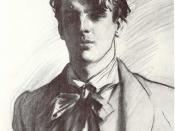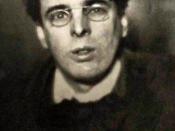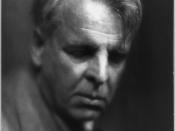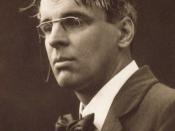Imagine going to battle and knowing you will die, yet it is the most important moment of your life. This is the situation in "An Irish Airman foresees his Death," by William Butler Yeats. This poem describes an Irish airman, airman being someone in the air force who is going to battle but doing so without a reason. This airman believes he will die in this war and it will be the most important moment in his life.
In the first stanza, Yeats describes the man's feelings about the war. "Those that I fight I do not hate / those that I guard I do not love," Yeats writes. He's going into this battle without a preference. It's as if he has no feelings about the battle. The second stanza gives the readers more insight as to why the outcome of the battle won't matter to him.
"My country is Kiltartan's Cross / My countrymen Kiltartan's poor," Yeats says. So the airman is a poor man from Kiltartans. Yeats also writes, "No likely end could bring them loss / Or leave them happier than before." "Them" being the poor, Yeats says the poor, including the airman, will not gain nor lose anything from the outcome of the battle.
When Yeats writes, "Nor law, nor duty bade me fight / Nor public men, nor cheering crowds," he's saying that no one really cares if the man goes or not." Yet the man still feels driven to go. "A lonely impulse of delight / Drove to his tumult in the clouds," Yeats states. The man does not feel much toward either side of the battle; he's one the country's poor so the outcome is not going to affect him, yet he's still going. Maybe it's because he knows going into this battle and giving his life would be the most important thing he's done.
The last stanza shows the man thinking about his life. "I balanced all, brought all to mind." The last three lines of the stanza describes that this Irish airman sees his life as a waste. "The years to come seemed waste of breath / A waste of the years behind / In balance with this life." This shows that the airman sees his past as a waste and his future as a waste compared to the moment in the clouds. He sees dying in this battle as the most important moment in his life.
The airman does not care for either side of the battle, no one cares that he goes to battle, he will not gain anything from the battle, and his life has been and would have been a waste. Through all of this, dying in this battle is the most important thing to the airman. This is something that he does not see as a waste, nothing else but that moment in the clouds matters to the Irish airman.





